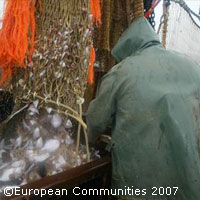Commission set to cut Baltic fishing quotas
The European Commission has proposed a series of cuts in the Baltic Sea's fishing quotas for 2008. The proposals are based on scientific advice issued earlier this year by ICES (the International Council for the Exploration of the Sea), as well as the opinion of the Commission's Scientific, Technical and Economic Committee on Fisheries (STECF) and input from stakeholders. Of particular concern is the condition of the region's two cod stocks; the Commission is proposing a 23% cut in the eastern cod fishery quota and a 33% cut for the western stock. ICES had called for a complete closure of the eastern cod fishery and a 50% cut in the quotas for the western fishery. According to the Commission, a major problem in the cod fisheries is the underreporting of catches, although control measures outlined in the multi-annual plan for Baltic cod should address this issue when they are implemented by the Member States. The Baltic salmon population is also in trouble, with numbers of adult fish likely to fall substantially over the coming years as juvenile salmon are currently experiencing an extremely low survival rate. With this in mind, the Commission is proposing a 15% cut in the salmon catch, and it will address the problem further in the Baltic salmon action plan, which is under revision at the moment. One fishery which bucks this negative trend is the central herring stock, and the Commission suggests that the quota for this fishery be increased by 11%. However, the same cannot be said for the other herring fisheries in the region, and so they too are set to see quota cuts. In addition to reducing catches, the Commission is also keen to ensure that wider conservation rules are correctly applied. 'This is an area that needs a lot of improvement,' commented Mireille Thom, the European Commission's spokesperson for fisheries and maritime affairs. 'The situation has been acknowledged both by the Member States and the fishing industry around the Baltic Sea and they have committed to improving things.' The proposals will be discussed by European fisheries ministers at their Council meeting in October. Overfishing is just one of a number of threats facing the Baltic Sea. Excess nutrients from agriculture are washed into the sea where they cause eutrophication. The sea is also threatened by pollution with hazardous substances from industrial activities and transport.



